AI in legal, especially in the realms of legal research, case analysis, and document review. By harnessing the power of AI, legal professionals can now navigate the vast expanse of legal documents and case law with unprecedented speed and precision. This section explores the mechanisms of AI in legal research and analysis and its benefits, as well as showcases leading AI-driven platforms transforming the field.
1. Mechanisms of AI in Legal Research and Analysis

AI in legal research primarily utilizes Natural Language Processing (NLP) and machine learning algorithms to understand and process complex legal language.
NLP enables AI systems to read, decipher, and interpret legal documents, identifying relevant case laws, statutes, and precedents.
Machine learning algorithms, on the other hand, learn from data inputs, improving their search and analysis capabilities over time to predict outcomes and suggest relevant legal texts based on previous interactions.
- Automated Legal Research: AI systems streamline legal research by quickly scanning millions of legal documents to find relevant information. This automation significantly reduces the time and effort required for manual research, allowing legal professionals to focus on analysis and strategy.
- Case Analysis and Document Review: AI tools analyze legal documents to highlight relevant facts, arguments, and precedents. They can also identify patterns and connections across cases that might not be immediately apparent to human researchers, providing deeper insight and supporting more robust legal arguments.
- Predictive Analysis: Some AI platforms offer predictive analytics, which analyzes historical data to forecast potential outcomes of legal matters. This feature aids lawyers in assessing the strengths and weaknesses of their cases, guiding strategic decision-making.
Examples of AI-driven Platforms in Legal Research
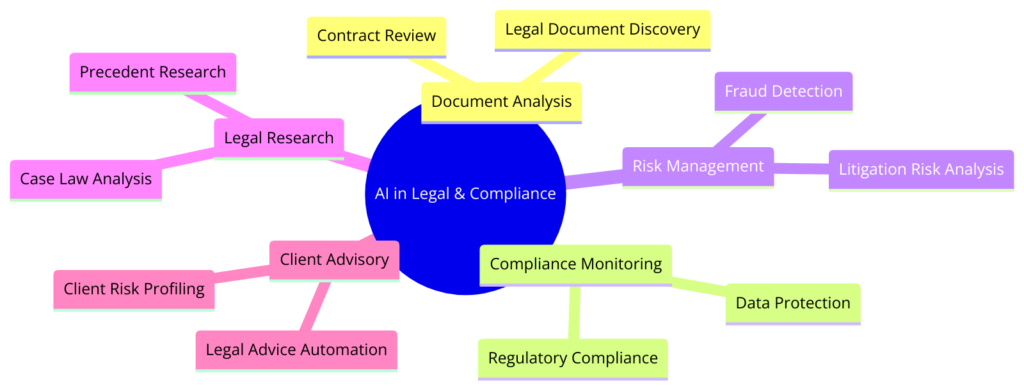
Several AI-driven platforms have emerged as frontrunners in transforming legal research and analysis:
- ROSS Intelligence: Utilizing IBM Watson’s cognitive computing technology, ROSS Intelligence answers legal questions by searching through case law and statutes to provide concise answers, references, and readings.
- LexisNexis: With its advanced AI capabilities, LexisNexis offers a comprehensive suite of legal research tools that help professionals find relevant precedents and legal news and efficiently conduct in-depth legal analysis.
- CaseText: CaseText’s AI-powered legal research tool, CARA, uses machine learning to analyze legal briefs and then finds relevant case law and statutes, streamlining the research process for legal practitioners.
These platforms exemplify AI’s transformative potential in legal research, offering tools that expedite the research process and enhance the quality of legal analysis.
As AI technology continues to evolve, its impact on legal research and analysis is expected to grow, further revolutionizing law practice.
AI’s impact on legal research and analysis marks a significant advancement in legal technology.
It offers tools that enhance efficiency, accuracy, and strategic insight.
As legal professionals increasingly adopt these AI-driven platforms, the legal industry stands on the cusp of a new era marked by innovation and improved access to legal information.
The ongoing development of AI technologies promises to expand their capabilities further, making legal research more accessible, comprehensive, and efficient.
2. AI in Contract Management

Artificial Intelligence (AI) is revolutionizing the field of contract management by automating processes that were traditionally time-consuming and prone to human error.
This technology’s ability to analyze, understand, and generate legal documents offers unprecedented efficiency and accuracy in drafting, reviewing, and managing contracts.
Role of AI in Contract Management
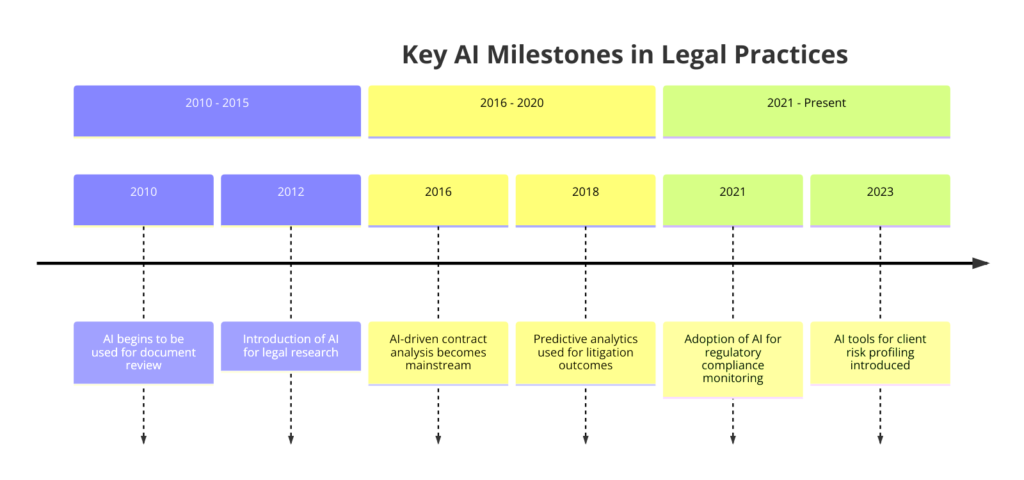
AI technologies streamline contract management through several innovative approaches:
- Automated Contract Creation: AI-powered platforms utilize templates and natural language processing (NLP) to automate the drafting of contracts. These platforms can generate personalized agreements based on specific inputs, ensuring that the documents comply with legal standards and are tailored to the parties’ needs.
- Efficient Contract Review: AI tools can quickly review contracts, identifying key clauses, obligations, and potential legal issues. This capability significantly reduces the review time and helps mitigate risks by ensuring all contracts meet regulatory and compliance requirements.
- Contract Analysis and Management: Beyond creation and review, AI systems offer sophisticated contract analysis, tracking obligations, and performance metrics. They can alert parties about upcoming deadlines, renewals, and compliance requirements, facilitating proactive contract management.
AI Tools and Platforms in Contract Management
Several AI tools and platforms have emerged as leaders in enhancing contract management processes:
- Kira Systems: Known for its machine learning technology, Kira Systems helps organizations extract and analyze information from contracts. It is particularly effective in due diligence, contract review, and knowledge management.
- Luminance: Luminance employs AI to understand and learn from the structure of legal documents, making it easier for legal teams to conduct thorough contract reviews and due diligence processes.
- Icertis: The Icertis Contract Management platform leverages AI to manage the complete contract lifecycle, offering insights into contract data that help businesses minimize risks and maximize revenue.
Case Studies Showcasing AI’s Efficiency
- Global Law Firm Adoption: A global law firm implemented Kira Systems for its due diligence processes, resulting in a 50% reduction in the time required to review contract documents for M&A transactions. This not only improved efficiency but also enhanced the accuracy of the review process.
- Corporate Contract Management: A multinational corporation adopted the Icertis platform to manage its vast contracts across different departments. The AI-driven insights and automation capabilities of Icertis allowed the corporation to streamline contract approval processes, improve compliance, and achieve better control over contractual obligations and risks.
AI’s integration into contract management represents a significant leap forward in legal technology, offering tools that automate drafting, streamline review processes, and enhance overall contract lifecycle management.
As AI technologies evolve, their role in contract management is expected to grow, bringing more sophisticated solutions to the challenges of managing complex legal agreements.
The adoption of AI in contract management increases operational efficiency.
It enables legal teams to focus on strategic aspects of legal work, promising a future where legal processes are more efficient, accurate, and aligned with business objectives.
3. AI in Compliance Monitoring and Management
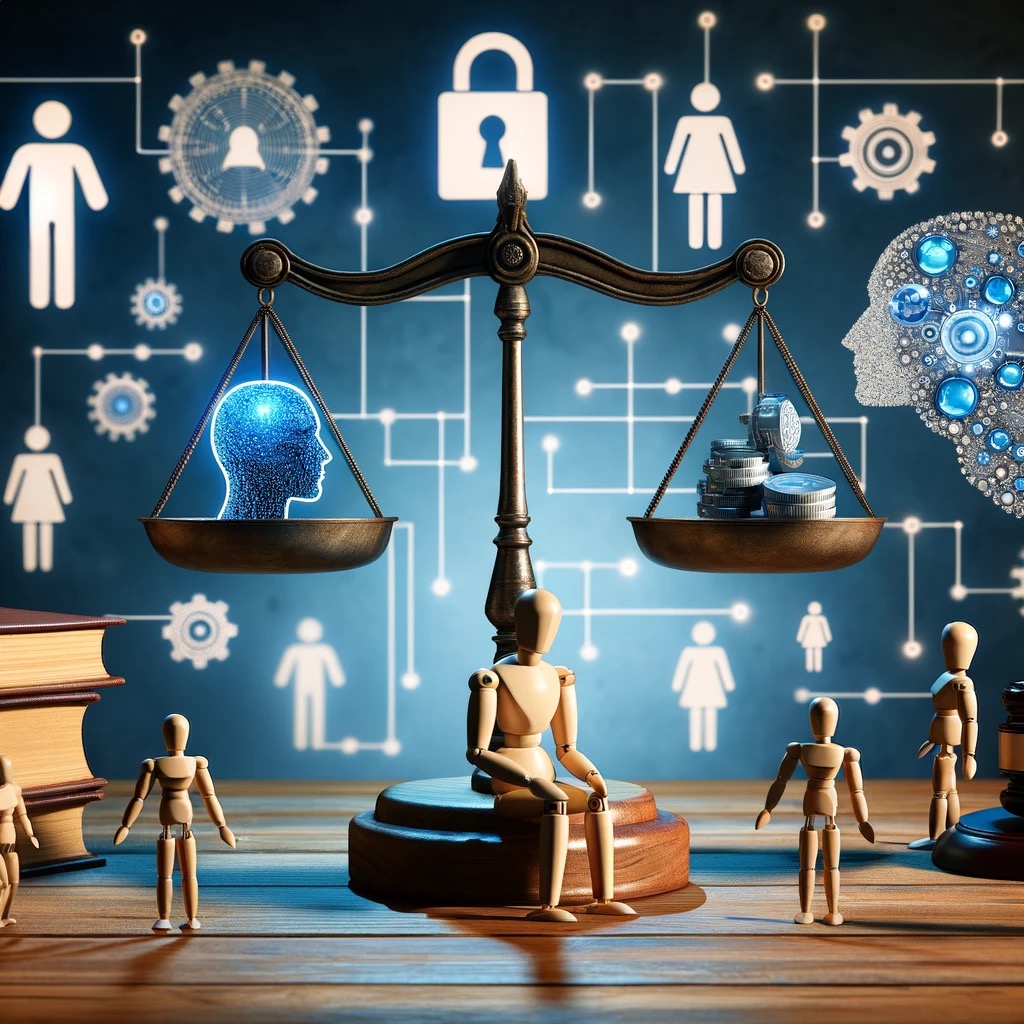
In an era of constantly evolving regulatory landscapes, Artificial Intelligence (AI) stands out as a pivotal tool for ensuring compliance across a broad spectrum of industries.
By leveraging AI, organizations can automate the monitoring of regulatory changes, assess compliance risks, and implement proactive compliance measures.
Application of AI in Compliance Monitoring and Management

AI enhances compliance monitoring and management through several critical applications:
- Automated Regulatory Tracking: AI systems can continuously monitor regulatory environments across the globe, automatically identifying and alerting organizations to relevant changes. This automation ensures that businesses stay up-to-date with compliance requirements without manual oversight.
- Risk Assessment and Management: Through machine learning algorithms, AI can analyze vast amounts of data to identify compliance risks and anomalies. These insights enable organizations to prioritize compliance efforts and mitigate risks more effectively.
- Proactive Compliance Strategies: AI tools provide predictive analytics to forecast potential compliance issues based on emerging trends and historical data. This capability allows companies to adopt proactive measures, reducing the likelihood of non-compliance and associated penalties.
Innovations in AI for Compliance Management
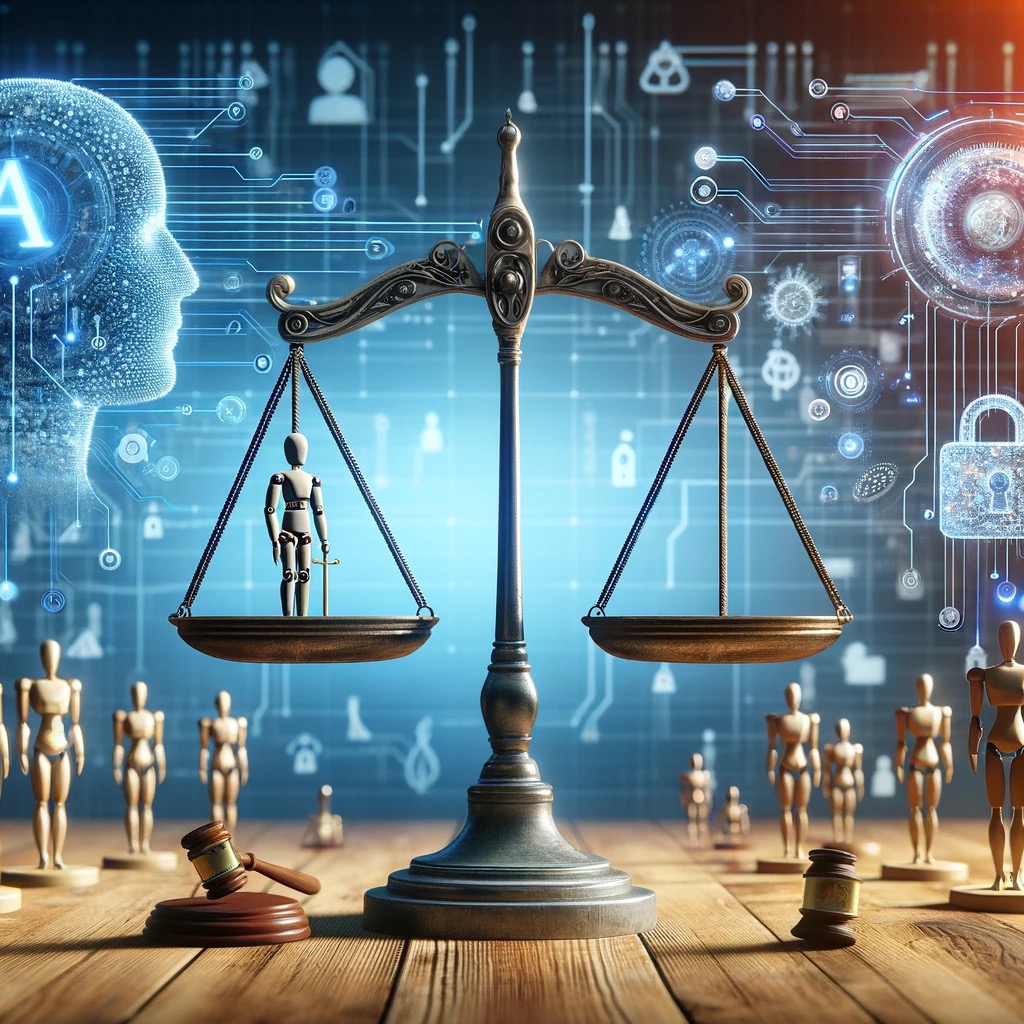
Several innovative AI technologies have been developed to address the complexities of compliance management:
- Regulatory Technology (RegTech) Solutions: RegTech companies use AI to offer solutions that streamline compliance processes, from KYC (Know Your Customer) procedures to anti-money laundering (AML) screening. These solutions automate compliance checks and reporting, making it easier for companies to adhere to regulatory requirements.
- AI-driven Compliance Platforms: ComplyAdvantage and Ascent leverage AI to provide tailored compliance insights and automation. These platforms analyze regulatory updates, assess their impact on specific business operations, and automate compliance workflows.
Real-World Examples of AI in Compliance
- Financial Sector Implementation: A leading bank implemented an AI-driven compliance system to monitor real-time transactions for signs of money laundering. The system’s ability to analyze patterns and flag suspicious activities significantly improved the bank’s compliance with AML regulations.
- Healthcare Compliance Monitoring: A healthcare provider utilized an AI platform to ensure compliance with healthcare regulations, including HIPAA. The AI system automated the tracking of regulatory changes and assessed the provider’s compliance policies, ensuring they were always up-to-date and effectively implemented.
AI’s compliance monitoring and management role transforms how organizations approach regulatory challenges.
By automating the tracking of regulatory changes, assessing compliance risks, and enabling proactive compliance strategies, AI technologies offer a more efficient, accurate, and forward-looking approach to compliance.
As AI continues to evolve, its potential to further innovate compliance management practices promises to provide organizations with even greater capabilities to navigate the complex regulatory landscapes they face.
4. AI in Litigation Prediction and Legal Advising

Artificial Intelligence (AI) has brought about significant advancements in litigation prediction and legal advising, providing legal professionals with powerful tools to inform strategy and decision-making.
By analyzing vast datasets of legal precedents, outcomes, and trends, AI can predict the likelihood of various litigation outcomes, offering invaluable insights for lawyers and their clients.
Use of AI to Predict Litigation Outcomes
AI’s predictive capabilities in litigation are grounded in data analytics and machine learning algorithms that analyze historical legal data, including past judgments, case law, and legal precedents.
These algorithms identify patterns and correlations that can significantly accurately predict future case outcomes.
This predictive analysis aids lawyers in assessing the strengths and weaknesses of their cases, advising clients more effectively, and formulating more informed legal strategies.
- Enhancing Legal Strategy: With insights from AI predictions, legal teams can make strategic decisions regarding case management, such as whether to settle or proceed to trial. Predictive analytics can also help identify the most relevant precedents and arguments likely to influence a case’s outcome.
- Data-Driven Legal Advising: AI enables lawyers to provide data-driven advice to clients, basing recommendations on statistical analyses of similar cases and outcomes. This approach adds a quantitative dimension to legal advising, supplementing the lawyer’s expertise with empirical evidence.
Impact of Predictive AI Tools on Legal Practice
Predictive AI tools profoundly impact legal practice by enhancing efficiency, accuracy, and the overall quality of legal advising.
They democratize access to legal insights, allowing smaller firms and solo practitioners to compete more effectively with larger entities.
Moreover, these tools are reshaping client expectations, as clients now seek and value data-driven insights into their legal matters.
Examples of AI Applications in Legal Advising
- Premonition is an AI system that analyzes the performance of lawyers and judges to predict the outcomes of litigation. It helps legal professionals choose the most suitable strategies and arguments based on historical performance data.
- Lex Machina is a platform that provides legal analytics for lawyers, offering insights into the behavior of judges, lawyers, and parties. It helps craft data-backed litigation strategies and predict case outcomes.
- Ravel Law: Acquired by LexisNexis, Ravel Law offers analytics on case law and judicial trends. It enables lawyers to predict how judges might rule on certain matters based on their past decisions.
Integrating AI in litigation prediction and legal advising transforms the legal landscape, offering unprecedented capabilities for data-driven decision-making and strategy formulation.
By leveraging predictive analytics, legal professionals can approach cases more confidently and precisely, ultimately leading to better client outcomes.
As AI technology advances, its role in legal practice is expected to expand, further enhancing the efficacy and accessibility of legal services.
5. Challenges and Ethical Considerations
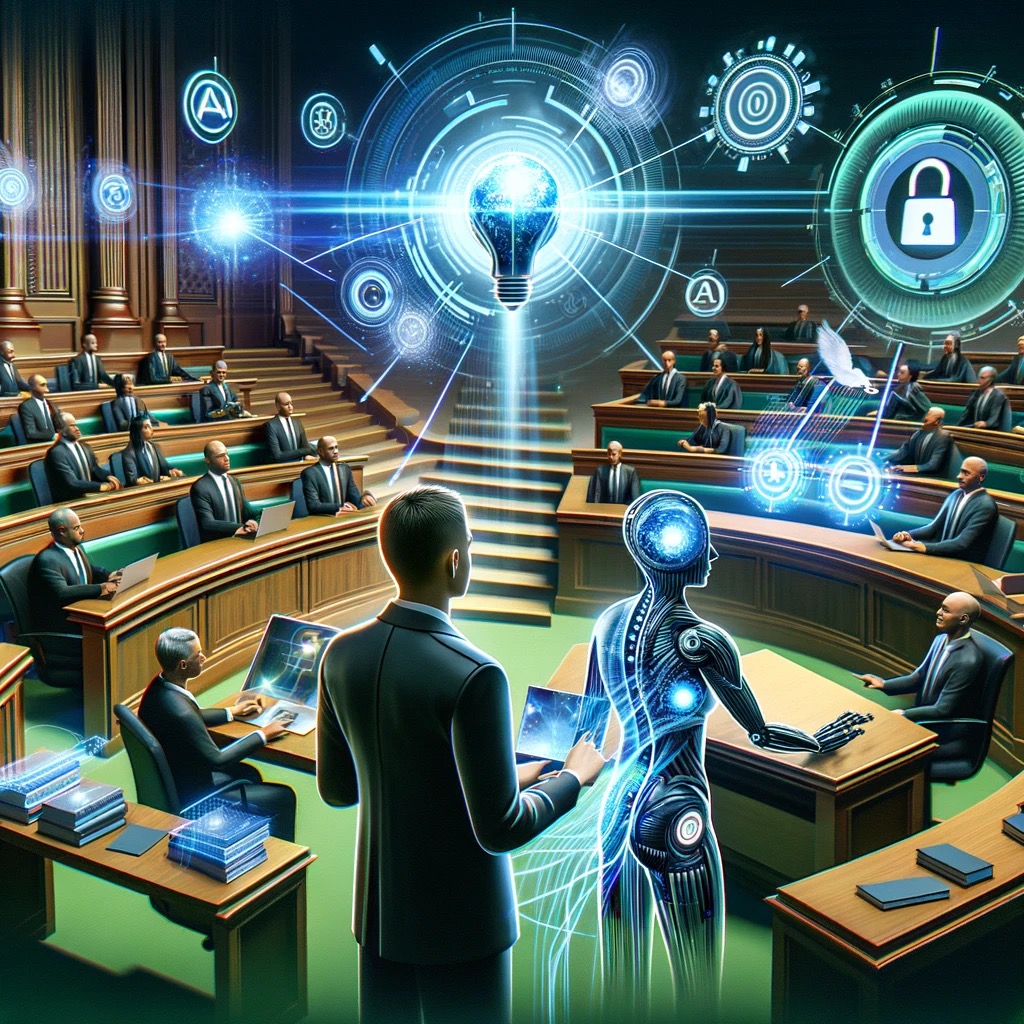
Integrating Artificial Intelligence (AI) into legal and compliance sectors heralds significant advancements in efficiency and capability.
However, this technological evolution has its challenges and ethical dilemmas.
As AI becomes more embedded in legal practices, accuracy, accountability, transparency, and ethics issues come to the forefront, necessitating careful consideration and management.
Accuracy and Reliability
One of the primary concerns with AI in legal applications is ensuring the accuracy and reliability of AI-generated insights and predictions.
Given the high stakes in legal decisions, inaccuracies in AI algorithms can lead to unjust outcomes, misinformed legal advice, and potential miscarriages of justice.
- Data Quality and Bias: The accuracy of AI systems is highly dependent on the quality and representativeness of the data on which they are trained. Biased or incomplete datasets can lead to skewed AI predictions, inadvertently perpetuating historical biases in legal outcomes.
Accountability and Transparency
The opaque nature of some AI algorithms, particularly those involving deep learning, raises questions about accountability and transparency in legal decision-making.
- Algorithmic Transparency: The “black box” nature of specific AI systems makes it difficult to understand how they arrive at particular conclusions or predictions, complicating efforts to hold these systems accountable for their outputs.
- Legal Responsibility: Determining liability for erroneous AI advice or decisions presents a complex challenge. The distributed nature of AI development and deployment complicates attributing responsibility when AI applications lead to legal misjudgments or harm.
Ethical Considerations
The deployment of AI in the legal sector also raises profound ethical questions concerning privacy, fairness, and the impact on the legal profession.
- Privacy Concerns: AI systems often require access to vast amounts of sensitive data, raising concerns about privacy and data protection. Ensuring that AI applications respect client confidentiality and comply with data protection laws is paramount.
- Bias and Fairness: Although AI has the potential to reduce human bias, there’s a risk that AI systems themselves may develop biases based on their training data. Addressing these biases to ensure fair and equitable legal outcomes is a significant ethical challenge.
- Impact on Employment: AI’s automation of legal tasks could lead to job displacement within the legal sector. While AI can enhance the efficiency of legal processes, its impact on employment raises ethical considerations about the profession’s future.
The challenges and ethical considerations of integrating AI into legal and compliance sectors are substantial but manageable.
Addressing these issues requires a concerted effort from legal professionals, technologists, and policymakers to develop AI applications that are accurate, accountable, transparent, and ethically sound.
By fostering an open dialogue on these topics and establishing clear guidelines and standards, the legal profession can harness the benefits of AI while mitigating its risks, ensuring that the deployment of AI technologies aligns with the highest standards of legal practice and ethical responsibility.
6. The Future of AI in Legal and Compliance
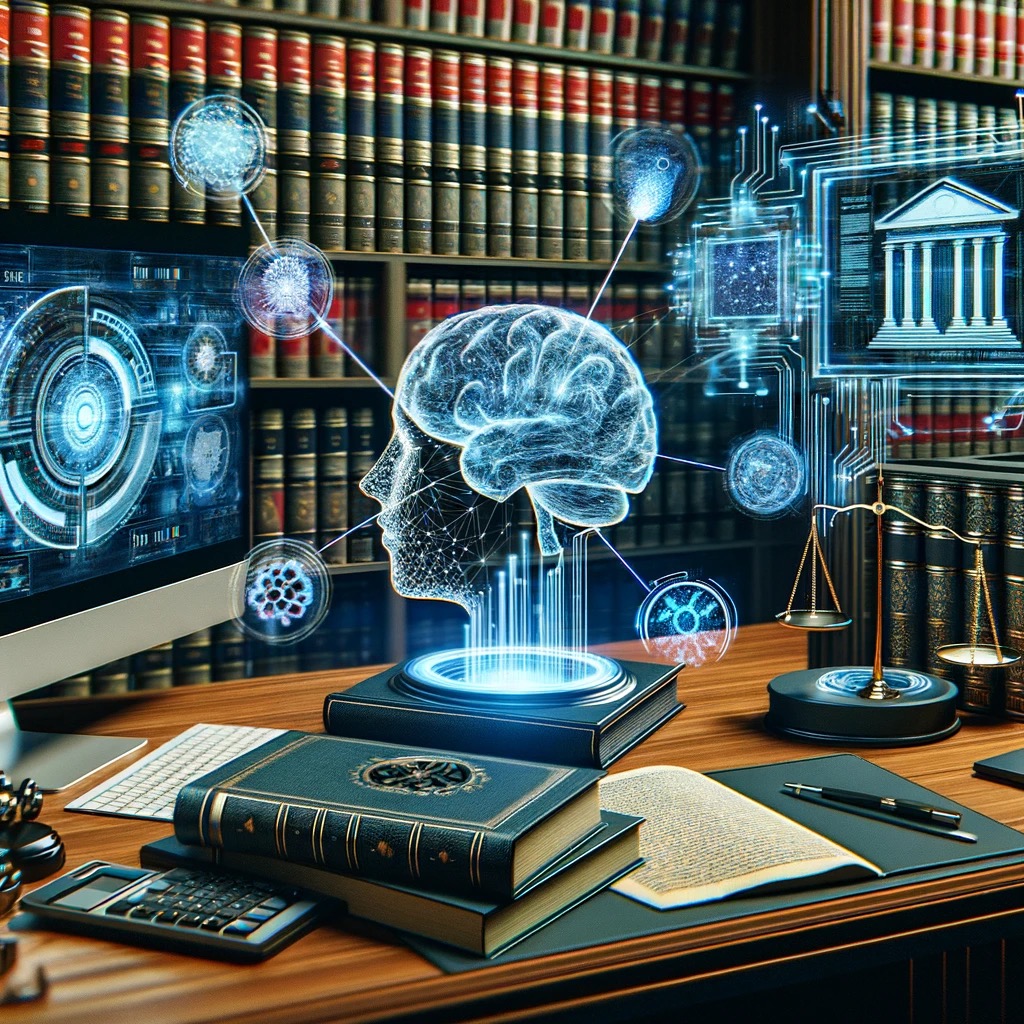
The future of Artificial Intelligence (AI) in the legal and compliance sectors is marked by both promise and anticipation.
As AI technologies mature, their potential to further revolutionize these fields becomes increasingly evident.
Predictions for AI Advancements in the Legal Sector
- Enhanced Predictive Analytics: AI’s capability to predict litigation outcomes and advise on compliance issues is expected to become even more sophisticated. Future advancements allow for a more nuanced analysis of legal trends, judge behaviors, and regulatory changes, offering legal professionals unprecedented insights for strategic decision-making.
- Greater Integration of Natural Language Processing (NLP): Advances in NLP will likely lead to more intuitive and efficient legal research tools capable of understanding and processing complex legal queries with greater accuracy. This significantly reduces the time required for legal research and document review.
- Automation of More Complex Legal Tasks: As AI technologies evolve, their potential to automate more sophisticated legal tasks, including legal writing and argumentation, will expand. This could further transform the landscape of legal practice, making routine tasks more efficient and allowing lawyers to focus on higher-value strategic work.
- Blockchain Integration for Contract Management and Compliance: The convergence of AI with blockchain technology promises enhanced security, transparency, and efficiency in contract management and compliance monitoring. Smart contracts, automated by AI and secured by blockchain, could ensure that legal agreements are self-executing and fully compliant with regulatory requirements.
Emerging Trends in AI-Driven Legal Practices
- Ethical AI Development: Recognizing the challenges and ethical considerations associated with AI, there is a growing trend towards developing ethical AI frameworks. These aim to ensure that AI technologies in the legal sector are transparent, accountable, and free from bias.
- AI in Alternative Dispute Resolution (ADR): AI is set to play a significant role in ADR processes, including mediation and arbitration. AI can offer predictions and recommendations by analyzing historical dispute outcomes, potentially leading to more amicable and efficient resolutions.
- Collaborative AI Tools for Legal Teams: Future AI tools will likely emphasize collaboration, enabling legal teams to work together more effectively, regardless of geographical location. These tools will support shared research, document review, and case management, enhancing the cohesion and efficiency of legal workflows.
Implications for the Legal Profession
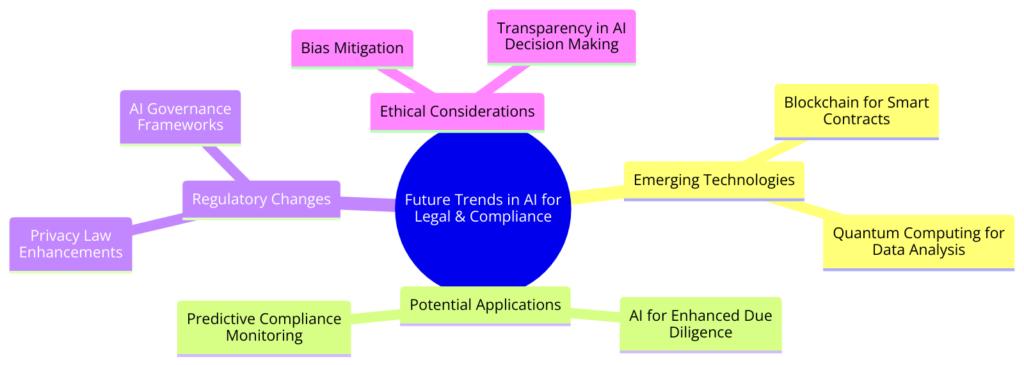
The continued advancement of AI in the legal and compliance sectors promises to enhance the efficiency, accuracy, and accessibility of legal services.
However, to leverage these technologies effectively, legal professionals must continue to be educated and adapt.
Moreover, the legal profession must remain vigilant regarding the ethical implications of AI, ensuring that advancements in technology continue to serve the interests of justice and equity.
The future of AI in legal and compliance is one of exciting possibilities and challenges.
As AI technologies advance, they offer the potential to transform legal practices further, making legal services more efficient, accurate, and accessible.
However, realizing this potential will require careful attention to the ethical implications of AI, ongoing innovation, and a commitment to integrating AI responsibly into legal practices.
The journey ahead for AI in the legal sector is one of continuous exploration, learning, and adaptation, promising a future where legal practices are more aligned with society’s evolving needs and expectations.
7. Recap of AI’s Transformative Role
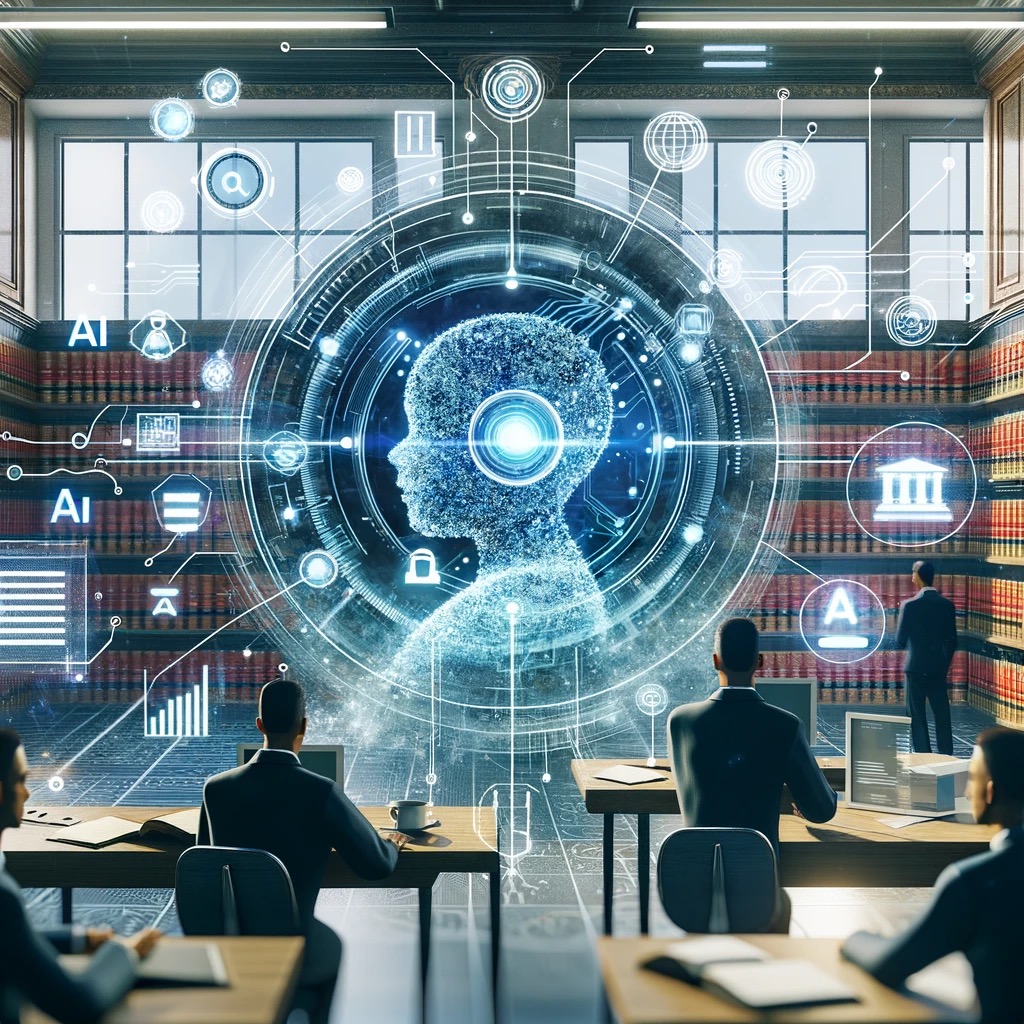
AI technologies have significantly enhanced legal research and analysis, enabling legal professionals to access and interpret vast amounts of legal information with unprecedented speed and accuracy.
In contract management, AI has automated complex processes, from drafting to compliance monitoring, streamlining workflows, and reducing the potential for human error.
Similarly, in compliance monitoring and management, AI’s ability to track regulatory changes and assess compliance risks in real time has provided organizations with the tools to proactively address potential issues, ensuring adherence to legal standards.
The use of AI for litigation prediction and legal advising has offered a glimpse into the future of legal strategy, where data-driven insights inform decision-making and case outcomes.
Despite these advancements, integrating AI into the legal and compliance sectors is not without its hurdles.
Challenges related to accuracy, accountability, transparency, and ethical considerations have emerged as critical areas requiring diligent attention and ongoing management.
Encouraging Ongoing Innovation and Responsible Integration
The future of AI in legal and compliance sectors is bright, with potential for further innovation and advancement.
However, realizing this potential hinges on the legal profession’s commitment to responsible integration.
Addressing the challenges of AI requires a concerted effort among legal practitioners, technologists, and policymakers to develop standards and frameworks that ensure AI’s ethical and equitable application.
The path forward involves embracing ongoing innovation while remaining vigilant about AI technologies’ ethical implications.
Legal professionals must stay informed about AI advancements and actively engage in discussions about their responsible use and the impact on legal ethics and practice.
The Potential for AI to Drive Further Advancements
As AI technologies evolve, their capacity to drive further advancements in legal and compliance sectors remains vast.
The ongoing development of AI promises to enhance the efficiency and accuracy of legal services and democratize access to justice, making legal advice and representation more accessible to a broader segment of society.
In conclusion, AI’s role in transforming the legal and compliance sectors is profound and ongoing.
Integrating AI offers a future where legal practices are more efficient, accurate, and aligned with the principles of justice and fairness.
By encouraging innovation and ensuring the responsible use of AI, the legal profession can harness these technologies to continue improving legal services and outcomes for all.
FAQ & Answers
1. How is AI used in the legal and compliance sectors?
AI is utilized for legal research, contract management, compliance monitoring, litigation prediction, and providing legal advising, significantly improving efficiency and decision-making.
2. What are the challenges of implementing AI in legal practices?
Challenges include ensuring the reliability and accuracy of AI tools, maintaining ethical standards, and addressing concerns about transparency and accountability.
Quizzes
Quiz 1: “AI in Legal Tech” – Match AI technologies to their applications in legal and compliance scenarios.
For a quiz on “AI in Legal Tech,” we’ll match AI technologies with their applications within legal and compliance scenarios. This will help illustrate how AI is transforming the legal sector, making processes more efficient and helping professionals navigate the complex landscape of law and compliance.
AI Technologies:
- Natural Language Processing (NLP)
- Machine Learning (ML)
- Predictive Analytics
- Document Automation and Management
- Chatbots and Virtual Assistants
- Image Recognition
- Knowledge Management Systems
Legal and Compliance Applications:
A) Contract Review and Analysis: Automating the review of legal documents to identify key clauses and potential issues. B) Legal Research: Assisting lawyers by quickly finding relevant cases, statutes, and legal precedents. C) Fraud Detection: Identifying potentially fraudulent activities through analysis of patterns and anomalies in data. D) Client Interaction: Providing automated responses to common legal inquiries and assistance with basic legal tasks. E) Regulatory Compliance Monitoring: Keeping track of changes in legislation and ensuring that practices are in compliance with current laws. F) Evidence Gathering: Using technology to analyze images and videos as part of evidence in legal cases. G) Case Management: Organizing and managing legal knowledge and case-related information effectively.
Matches:
- Natural Language Processing (NLP): A) Contract Review and Analysis, B) Legal Research – NLP is crucial for understanding and processing legal documents and literature.
- Machine Learning (ML): C) Fraud Detection, E) Regulatory Compliance Monitoring – ML algorithms excel at identifying patterns and anomalies that may indicate fraudulent activities or compliance issues.
- Predictive Analytics: B) Legal Research, G) Case Management – Predictive analytics can forecast outcomes based on historical data, assisting in legal research and case management.
- Document Automation and Management: A) Contract Review and Analysis, G) Case Management – Automating the creation, storage, and retrieval of legal documents helps in efficient contract review and case management.
- Chatbots and Virtual Assistants: D) Client Interaction – AI-powered chatbots and virtual assistants can handle routine inquiries and provide legal assistance to clients.
- Image Recognition: F) Evidence Gathering – Image recognition technology can analyze visual data, which is crucial for gathering and examining evidence in legal cases.
- Knowledge Management Systems: B) Legal Research, G) Case Management – These systems are designed to organize and manage legal knowledge, making legal research and case management more efficient.
These matches demonstrate the diverse applications of AI technologies in the legal field, ranging from document analysis and legal research to client interaction and compliance monitoring, significantly impacting the efficiency and effectiveness of legal services.
Quiz 2: “Innovations in Legal Practices” – A quiz on recent AI innovations in the legal sector.
For a quiz on recent AI innovations in the legal sector, I’ll craft questions that highlight how artificial intelligence is being used to transform practices within the industry. These questions will explore new technologies and applications that have become significant in modern legal practices.
Question 1: AI in Contract Analysis
Which AI technology has significantly improved the efficiency of contract review processes in legal practices?
A) Blockchain
B) Natural Language Processing (NLP)
C) Virtual Reality
D) Quantum Computing
Question 2: Predictive Justice
What is predictive justice, and how is AI utilized in this area?
A) A method for predicting judicial decisions based on real-time news updates.
B) Using historical data and outcomes to predict the likely outcomes of legal cases.
C) AI’s role in predicting when court cases will occur.
D) A system that replaces judges with AI to ensure unbiased rulings.
Question 3: Document Automation
What does document automation in legal practices typically involve?
A) Replacing all legal documents with digital tokens.
B) Using AI to automatically generate legal documents based on templates and specific input parameters.
C) Automating the delivery of documents via drones.
D) Using robots to physically handle legal documents.
Question 4: AI and Compliance
How is AI being used to enhance compliance in the legal sector?
A) By creating more laws that are friendly to AI technologies.
B) AI is not relevant to legal compliance.
C) Utilizing AI to track changes in law and automatically update compliance documentation accordingly.
D) By reducing the number of lawyers needed in compliance roles.
Question 5: AI-Enhanced Legal Research
What advantage does AI-enhanced legal research offer over traditional methods?
A) It completely eliminates the need for human lawyers.
B) It allows for the visualization of legal concepts in virtual reality.
C) It provides faster, more accurate, and comprehensive case law and statutes searches.
D) It uses less electricity than traditional research methods.
Question 6: Chatbots in Legal Services
What role do chatbots play in legal services?
A) They are used to replace judges in small claims courts.
B) Chatbots assist with routine legal inquiries and can help direct clients to the appropriate resources or services.
C) Chatbots are mainly used for entertainment purposes in law firms.
D) They serve as the primary legal advisor for clients in trials.
Question 7: AI for Evidence Analysis
How does AI contribute to evidence analysis in legal practices?
A) AI is used to predict the evidence that will be most impactful in a trial.
B) AI analyzes large volumes of data, including texts, images, and videos, to uncover relevant information more quickly and accurately.
C) AI focuses only on digital evidence and ignores physical evidence.
D) AI physically presents evidence in courtrooms.
These questions and the detailed scenarios they present help illuminate the evolving role of AI in legal practices, from automating mundane tasks to aiding in complex decision-making processes. These innovations highlight the potential of AI to significantly enhance the efficiency and effectiveness of legal services.
Here are the answers to the quiz on recent AI innovations in the legal sector:
Question 1: AI in Contract Analysis
Correct Answer: B) Natural Language Processing (NLP) NLP has significantly improved the efficiency of contract review processes by automating the extraction and analysis of information from legal documents.
Question 2: Predictive Justice
Correct Answer: B) Using historical data and outcomes to predict the likely outcomes of legal cases. Predictive justice involves using AI to analyze past legal decisions to forecast the outcomes of future cases, helping lawyers better prepare and advise their clients.
Question 3: Document Automation
Correct Answer: B) Using AI to automatically generate legal documents based on templates and specific input parameters. Document automation in legal practices typically involves the use of AI to create necessary documents quickly and accurately, ensuring compliance and saving time.
Question 4: AI and Compliance
Correct Answer: C) Utilizing AI to track changes in law and automatically update compliance documentation accordingly. AI enhances compliance in the legal sector by monitoring legislative changes and automatically adjusting internal documents and processes to stay compliant.
Question 5: AI-Enhanced Legal Research
Correct Answer: C) It provides faster, more accurate, and comprehensive case law and statutes searches. AI-enhanced legal research offers significant advantages over traditional methods by using algorithms to quickly sift through massive databases, providing comprehensive and precise legal information.
Question 6: Chatbots in Legal Services
Correct Answer: B) Chatbots assist with routine legal inquiries and can help direct clients to the appropriate resources or services. Chatbots play a crucial role in legal services by handling routine inquiries, thus freeing up human resources for more complex tasks and improving client service.
Question 7: AI for Evidence Analysis
Correct Answer: B) AI analyzes large volumes of data, including texts, images, and videos, to uncover relevant information more quickly and accurately. AI contributes to evidence analysis by efficiently processing extensive data sets, which enhances the ability to uncover and interpret relevant information for legal cases.
These answers highlight the transformative impact of AI technologies across various aspects of legal practices, streamlining operations and providing sophisticated tools for legal professionals.